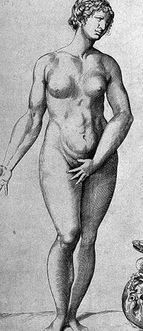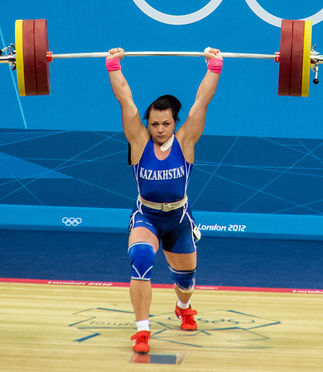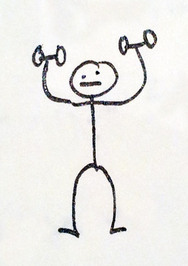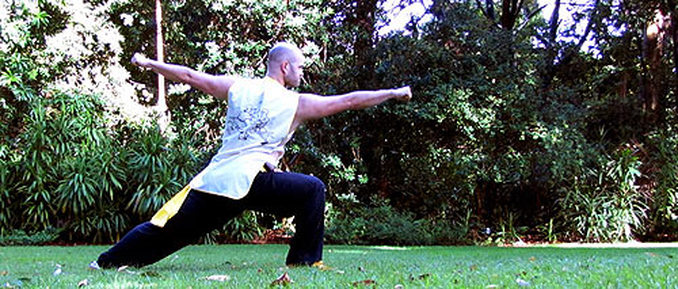 It always amazes me how strict people can be about rest periods. Here’s the thing: you can’t get it wrong. Sometimes people say you shouldn’t sit down, and they’re quite insistent. Keep standing, keep moving, keep your energy up – and there is a benefit to it, it’s about intention. But it always depends on what you’re doing. And not every workout is about psyching yourself up for some crazy intense training. Often, we might bitch about how other people spend too much time on their phones at the gym. But if you’ve just done a set of leg press or whatever, I don’t care if you check out all the dinners your friends have been sharing on facebook from the night before, while you recover enough to be able to do another set. And who cares, really? What is the point of resting? Recovery. So you can do stuff again, and do it well. Think about what you want to achieve.
0 Comments
We are told, more often than not, what relationships to have with our bodies, rather than to explore our own relationships with our bodies.
This for me, is an issue. Partly just because I don’t like to do what I’m told. We are taught to hate certain body parts or ways of being, we are told to be proud of some rare things, but often we learn to be ashamed of anything representative of pleasure or desire. And we are told to be proud of the things that are... most standardised. We are told we have certain flaws, or strengths, weak points and problem areas, we are taught to have some few favourite body parts, and we talk about beauty, but really - all this is generally interpreted through the language of desirability.  There is no hierarchy of attractiveness. Not in any absolute sense, not outside of what we have constructed as a culture. And that construction is an illusion. Much as I can tell, the people I have been attracted to in my life – there’s no set criteria. They have been different sizes, races and complexions, always different, and the similarities are difficult to quantify. And a gain or loss of ten pounds doesn’t change one single thing. And what people may find attractive about me, is often not what I would have expected. But the concepts, the ideas, the suggestion that you can control how people perceive you by changing your body, the promise of becoming more attractive through behaviour, discipline, training and hard work. It’s powerful. I find myself from time to time, wishing I looked a bit different. Wanting to ‘sculpt my body’ in one way or another. One could ask – what are you going to do about it? It’s a common question. It assumes that the pursuit of a goal will result in satisfaction, or at the very least that any attempt is worthwhile. I’m not going to diet, let alone starve myself, and I enjoy training very much, but there’s this other aspect, internally – why can’t I just resist the overwhelming weight of the cultural pressure to be thinner, the pervasive prejudices of an entire civilization simply by strength of will? Whhyyyy???  I’ve spent the last few months teaching one of the other personal trainers at work how to break wooden boards with her hands. The other day, we held a small demonstration, footage of which can be seen here. And on that day, I had three people ask me what the trick is. I said training, and conditioning the hand over time, and understanding appropriate progressions. I also pointed out that it’s easier with certain striking areas than others, but that is simply an aspect of understanding the nature of appropriate progressions. Now that I reflect upon it though, I think the question reveals something else that’s going on in the fitness industry. Of course there is no trick. It’s just training, conditioning the body, and developing over time. The two primary keys to progress are of course known, they are patience and consistency. Moving forward to what will be helpful when it is helpful, but not before. Avoiding injury, over-stimulation, boredom or stagnation. The easiest way to break a board is with a muscular – rather than bony – surface area. So of course we begin by practicing the correct technique and leverage, and getting the heel of the palm used to a small degree of impact. Over time, one may progress to striking with the knuckles, but of course – while stronger in a certain context, the knuckles are also more fragile and vulnerable to injury. So again, appropriate steps only. Move from the simple to the complex, what is doable to what is challenging.  All cultures I can think of have some history of making people – women especially – suffer for fashion. There was a brief report on TV the other day about a woman who lost feeling in her legs and may have suffered some degree of nerve damage because of her too-tight skinny jeans. Sure enough, there was this little discussion about fashion and harm, and it only brushed the surface. The whole foot-binding thing in China? I heard once that the idea was targeted – it was introduced by the new ruling class specifically to cripple the women so that the men would not be able to unite and rebel. They had to stay home and take care of the women. There would be no uprising. I’m certainly not the first person to point this out, but this obsession with dieting, with restriction – reframing depletion and literal physical weakness and exhaustion as if it’s a virtuous moral position – this obsession only keeps you weak, and insecure, and all it seems to do is rob you of energy so you can’t question it anymore. Think about how many hours are spent in the pursuit of beauty? I don’t believe a life can actually be wasted. All things lead you somewhere, teach you something in the end, and all lives are valid. You would have heard the phrase “no excuses” in relation to fitness training. I get the point, but the assumptions, for me, are askew.
When you eliminate shame and fear, the issue of excuses becomes redundant. All you are left with are reasons and actions. Reasons may be meaningless out of context, but in context, all reasons are valid. And there may be a million reasons to either train or not train – and sometimes one or the other is going to be the right answer for you. All of it is dependent on context. But excuses? They only exist in relation to shame and fear. When you are unashamed, you are free to perceive the truth of your own situation clearly, without judgement. And you will know if it is appropriate to work or to rest, not that those are ever your only options. Shame clouds perception. As does fear. We cannot rely on ourselves to make good choices for our own wellbeing, when we are prejudiced by fear and shame. I notice it quite profoundly – it’s easy to mistake simple for easy, and complex for difficult, but it often doesn’t work out that way in the end.
Chin-ups are essentially simple, yet quite difficult. Tai chi is extremely complex but it’s all about the elimination of tension within the body, so once you’ve grasped that physically, your practice becomes effortless. The thing is these days, if it’s effortless we think it won’t help us get into a smaller pair of pants, so why bother? Clearly it isn’t really about health anymore. Learning to move without tension is one of the most useful things in the world, as is learning to maximise tension. You want to be a rebellious badass? Start with not hating yourself. Hate the oppressive beauty standard? The patriarchy? There is nothing more rebellious you can do. Refuse to diet. Train not to be pretty but to be strong. To be functional, flexible, or for any reason that’s yours. And when you’re not at the gym, don’t worry about it. Invest your energies into something truly worthwhile.
These days we are terrified and in awe of people who don’t hate themselves. We try to find ourselves, find our strength, by emulating them. Of course it never works. Be only yourself, and be it proud. Your weaknesses, those things you are secretly ashamed of, they hold the clue to your true strengths. The added bonus is that refusing to hate yourself enables you to care about and value other people too. But if you keep beating yourself down, you’ll never trust anyone, you’ll never be able to be there for them, and you’ll never be able to accept love or kindness. Be a badass by not bothering to be a badass. Don’t harden the fuck up, soften the fuck down. Forgive yourself. Be free.  I have a shoulder problem. I’m always a little unsure how much I can do with it – I want to keep strong, and get stronger, and maintain my range of motion – which is to say, I want to improve my condition. I want the problem to resolve. I’ve been to my Osteopath, I know the exercises I’m supposed to do and what I’m supposed to avoid and all that – the boxes have all been ticked – but there’s always going to be this question mark – there’s always this aspect of needing to feel your way through. Some days, exercises I should be doing feel funky, uncoordinated or painful. Other days, exercises that I probably should steer clear of feel fine. And there are certain exercises that I’m supposed to do if they feel okay. And I often find myself coming back to these old programming ideas – I should be doing five sets of five reps, or I should train military press differently, train more scapular retraction, dumbbell rows, etc. I need to do this and this and that to maintain strength and range of motion and be strong. If you haven’t trained much at all in the last twenty years, or ever, starting a fitness program can be really daunting. It’s worth remembering, though, if health and longevity are important to you, you don’t need to rush it. Be patient. It’s the training itself that’s good for you; not some imagined result, it’s the process that improves your health, and also the process that can tax it, so there’s no need to hurry. If you’re working appropriately to where you are right now, today, in the context of your life, this is helpful.
It doesn’t matter if you’re not losing weight, when you’re exercising you’re still stimulating insulin sensitivity in your skeletal muscle. You’re still stimulating circulation to the brain, and all your vessels. You’re still exercising and improving the health of your heart and lungs. This idea that exercise “isn’t working” is a ruse. All exercise works, at something. What is it that you’re training? That’s what you’ll become good at. (Trigger warning: themes relating to violation and rape culture) |




